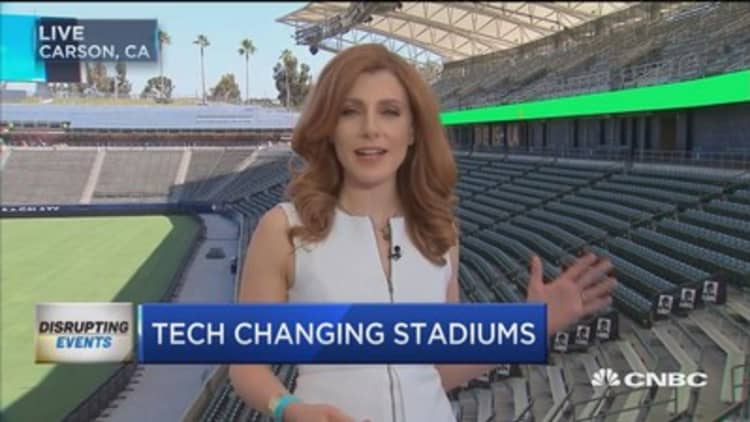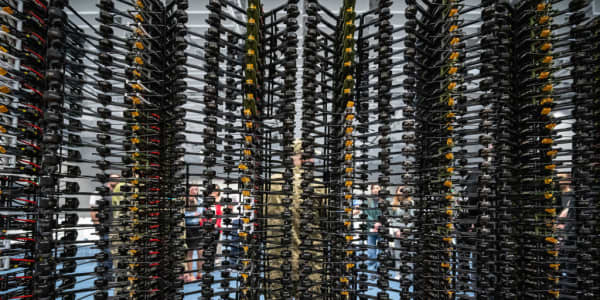
With so many home entertainment options, live-event venues are turning to new technologies in order to make the trip — and the exorbitant cost of tickets these days — worthwhile. That means upgrading everything from the ticket-buying process, to the way you navigate to your seat, to ordering food and drinks right from your smartphone and having them served to you.
Stadiums are getting "smart" — and none is more high tech than the Sacramento Kings Golden 1 Center, which opened this fall. Sacramento Kings owner Vivek Ranadivé describes the venue as the 'Tesla of sports stadiums.'
It's got everything from roving security robots to an app that puts control in consumers hands. "It will guide you to your parking spot. It will tell you how to get to your seat. And just like that," Ranadivé says, "the phone becomes your remote control. So now everything can be done through that remote. Whether it's ordering food, connecting with friends, adjusting the temperature. Even if your kid drops a hot dog, we'll get him a new hot dog before your kid starts crying."
Smart for ticket-holders — and the bottom line
While all this smart tech offers convenience for the ticket-holders, it's also saving money for the stadium, says Ranadivé. All this data — how people move around a stadium, to what kind of food they want to buy and when — becomes valuable to help the stadium adjust personnel to minimize traffic and lines.
"Technology allows you to optimize — not only increase revenues but also optimize in terms of how you price your products. With variable pricing for the games, we get rid of inventory that might just sit there otherwise," says Ranadivé. "We collect data on every part of the fan experience. We have a room called mission control that has a whole number of screens with people from all parts of the business — guest services, security, local police. We control everything, including traffic flow, to minimize time to get to the arena."
The Golden 1 Center is leading a nationwide trend. Cloud start-ups Built.io and VenueNext work with arenas and stadiums to help them leverage the power of big data and to give visitors mobile apps to help them get their money's worth.
More from CNBC Disruptor 50:
Disney's biggest entertainment bet isn't a super hero, Jedi knight or princess
'Street Fighter' moves into the mobile eSports market for gamers
Hotels, feeling the pinch of Airbnb, promote local experiences
Outsmarting the scalpers
A number of start-ups have evolved to try and tackle the problem of scalpers and bots snapping up the best seats, resulting in sky-high prices, which don't benefit artists. Songkick has raised more than $60 million for its platform it refers to as "concert discovery." It partners with artists to ticket more than 10,000 events annually, including those for Adele, Metallica and the Red Hot Chili Peppers. It claims that more than 15 million fans use its platform every month and has prevented more than 100,000 tickets from entering the secondary market via scalpers and bots last year.
Industry giant Ticketmaster has partnered with another start-up — mobile-only app Gametime — to target millennials. It works with both primary sources and resellers to offer last--minute ticket deals. Also targeting inflated prices: Edinburgh-based startup Citizen Ticket recently launched BitTicket, which uses blockchain technology to provide a transparent system that's resistant to fraud and counterfeiting.
And if you don't like your seat once you get there, start-up PogoSeat allows fans to search for other available seats, check out that alternate view, and upgrade once they're in the stadium.
And if you can't make it to a stadium — or afford a ticket — virtual reality technology is bringing that in-stadium experience home. NextVR is focused on livestreaming events, in VR, right to a mobile headset. It recently expanded its partnership with LiveNation to give fans front-row seats to concerts. And it partners with the NBA to live-stream those games — offering multiple perspectives from inside — including from right behind the net.
"Less than 5 percent of NBA fans can actually attend a game, but with VR, anybody can attend a game, anywhere in the world," says NextVR CEO David Cole. "There are 300 million NBA fans in China. Most will never be able to attend a game. This gives incredible reach for the live experience in markets that otherwise wouldn't have it."
Does the ability to live-stream a view from the floor of a basketball game threaten ticket sales? "There are so few fans who can actually experience a live game, we pose very little threat to the experience of actually going," says Cole. "When I can get into a game, I'm more inclined to go to a game because I've followed it in VR."








